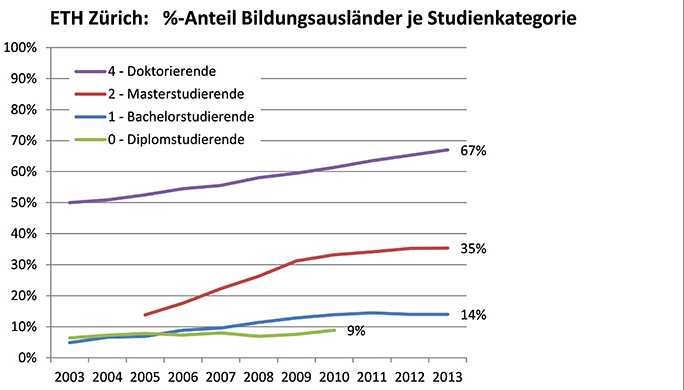What is at stake on 30 November
The success of ETH Zurich depends on its efforts both to network with leading researchers around the world and to train the top talent – regardless of where they come from. Restrictive immigration policies put that success in jeopardy.
ETH Zurich is far more international today than it was at the turn of the millennium. It is a magnet for students and researchers from all over the world: approximately two thirds of its professors, half its staff and a third of its undergraduate and doctoral students come from abroad (see Download ETH Perspectives. 13 (PDF, 2.5 MB)).
Many of them were taken aback in February, when the Swiss electorate decided that the number of residence permits should be subject to quotas and maximum numbers as of 2017. The EU’s decision to immediately exclude ETH Zurich students and researchers from its Erasmus+ and Horizon 2020 programmes caused further uncertainty.
Researchers in Switzerland have been able to take part again since September on the basis of a external page partial association approved by the Federal Council. However, it is expected that the treaty will be signed at the end of 2014 and that a prerequisite will be that Switzerland not rescind the agreement on the freedom of movement of persons. The external page Foreign Affairs Committee of the National Council has recently been lobbying the Federal Council to expressly consider the concerns of Swiss researchers and innovators during its planned talks with the EU.
Favourable conditions are at risk
On 30 November 2014 voters will decide on another initiative, the Ecopop Initiative, which also aims to restrict immigration – this time, in such a way that the population permanently resident in Switzerland must not increase by more than 0.2% on average over any given three-year period. Switzerland should also withdraw from all international treaties which run counter to the aim of stabilising the number of people living in Switzerland.
Under those circumstances, the sought-after full participation in Erasmus+ and Horizon 2020 would most probably become a hopeless illusion. It cannot be ruled out that Switzerland would be entirely excluded from international research and education programmes, or that researchers and universities in Switzerland would have to expend significantly more effort negotiating their participation on a case-by-case basis.
This would have long-term implications: networking with leading researchers around the world ensures that scientists at ETH Zurich always have access to the latest knowledge, especially in those areas of research connected with social challenges (e.g. health, food supplies, climate, financial markets, big data, etc.). No single country or university can solve these challenges alone; they all depend on international knowledge exchange.
Cooperation across borders
We can see the scope and importance of international networking for ETH researchers down to the smallest detail: ETH researchers collaborate with international co-authors on almost three out of every five publications they produce (57% between 2003 and 2012, and the trend is growing). Among all ETH publications, these international releases make a particularly significant impact. They are especially highly regarded and widely cited.
ETH researchers maintain research contacts around the world, especially with universities in Europe (4,272), North America (1,241) and Asia (572). Their most frequent partners are TU Munich, the Massachusetts Institute of Technology and the University of Oxford (see Download International Collaboration of ETH Zurich Faculty Members 2013).
The way ETH Zurich trains and supports the most talented students and young researchers – regardless of their origins – is just as important as research for its success. It is a part of ETH's strategy and enshrined in the external page performance mandate of the Federal Council that it offer an education that is internationally top-ranking and occupy a leading position in international research.
That mandate is now in jeopardy as Switzerland faces exclusion from international competition and residence requirements that would make it difficult for first-rate and up-and-coming researchers from abroad to come to ETH Zurich. This is why, since February, the president of ETH Zurich (e.g. in external page duz, the German university magazine), the rector (e.g. on external page Deutschlandfunk, German radio) and the vice-president for research and corporate relations (e.g. in external page Horizon 2020 Projects: Portal) have spoken out in various ways about the implications of Switzerland’s immigration policy and, for the first time, openly stated their positions on a referendum (e.g. in the Swiss Sunday paper external page Sonntagsblick).
In search of greater flexibility
Education becomes more international as it becomes more specialised, that is to say, from the level of Master's degrees and doctorates. Whereas it is mainly students with a Swiss school-leaving certificate who take up Bachelor’s degree courses at ETH Zurich (see chart), the Master's level has become more international in recent years following the Bologna reform. Even at the doctoral level, where the situation has always been very international, the proportion of international students increased from 50% to 67% between 2003 and 2013.
In order to ensure that an ETH education continues to be regarded as internationally top-ranking, the ETH Board recently decided to establish a legal basis for EPFL and ETH Zurich to restrict the number of foreign students admitted to Bachelor's courses if high student numbers were to put the quality of education at risk.
These proposals caused some controversy amongst the public and in the media. Yet while an initiative like Ecopop would massively restrict universities' flexibility in international competition, the proposed amendment to the external page ETH Act would have the opposite effect: it would give the two ETH entities an additional management and selection tool that several other universities in Switzerland already enjoy.


Comments
No comments yet